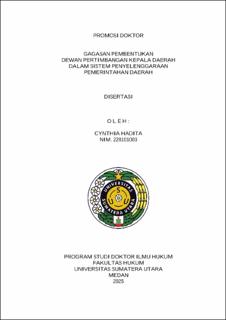| dc.description.abstract | The implementation of local government in Indonesia currently faces complex challenges related to regional institutions, inter-agency relationships, and the involvement of strategic actors in decision-making. The existing condition, that the Regional People's Representative Council (DPRD) has a legislative and supervisory function, but has not been fully able to support regional heads in making strategic decisions, especially in formulating long-term development policies and solving regional problems comprehensively, in addition to the lack of effectiveness in the existence of expert staff in giving consideration to regional heads because they are structurally under regional heads. To bridge this limitation, the idea of establishing the Regional Head Advisory Council (Watimkada) emerged as a form of strengthening regional autonomy. Watimkada can become an independent regional institution that provides input, suggestions, and considerations to Regional Heads both requested and unsolicited by Regional Heads and can support the improvement of the quality of local government by integrating professional and academic perspectives in the policy-making process.
This research uses a socio-legal method by examining a multidisciplinary perspective and using legal theory and social theory. The approach taken is a statute approach, conceptual approach, and comparative approach with the UK and Namibia, the data analysis used is qualitative, and data collection techniques are carried out with field research to Aceh, Yogyakarta, DKI Jakarta, North Sumatra.
The results of the study show that the formation of Watimkada is relevant in the context of strengthening regional autonomy in the system of local government administration. Watimkada is proposed to function as a non-structural institution that provides input, suggestions, and strategic considerations to regional heads in policy making whether requested/unsolicited, especially those related to long-term development and cross-sectoral issues. Empirical findings reveal that the non-uniformity of legality results in differences in practices because it has not been regulated in the Regional Government Law which delegates to be regulated in Regional Regulations and then stipulated by the Regional Head Decree, but in essence regional heads need independent and objective external views to avoid policies that are too political or pragmatic. Overall, this study concludes that Watimkada has the potential to be an important innovation in strengthening local government from a regional institutional perspective because it can increase community participation and strengthen regional autonomy. The establishment of Watimkada is not only about increasing the number of actors in policy making, but also about creating a more effective checks and balances mechanism at the regional level. With the right implementation, Watimkada can play a significant role in improving the quality of government and regional development that is more participatory and sustainable. The recommendation of this study is expected to be a revision to the Regional Government Law to provide a legal basis for the establishment of Watimkada.
Keywords: Strengthening; Autonomy; Consideration; Region; Policy. | en_US |


